#there’s a scene in the gentlemen when he pulls a gun out from his trench coat and I legit died when I saw him handle it
Text
find the vibe tag VII
Thank you for this excellent vibe, @talesofsorrowandofruin! I’m looking for “I’d offer moral support, but I have questionable morals”. Here’s one of the closest scenes I could find, featuring the Stars and Ships crew being idiots while under fire...
“Well, gentlemen and…anyone else. I’ll expect the other half of your payment from the drop location. Will that be all this afternoon?”
“Not quite,” the lead seller said, pulling a huge blast gun from under his trench coat.
Jax sighed.
The huge blast gun whirred, and the seller grinned, clearly enjoying the noise. “We want that cargo outta here. We don’t care which way. Crashed on a moon in your ship is fine with us—and cheaper.”
“You’re all so cheap,” Jax complained. “Always gotta con the system.”
“Says the conman.”
Jax paused. “Thank you.”
There was a metallic noise, and Aaliyah vaulted down from a behemoth junk pile, long sword in each hand. The sellers turned. Jax used the distraction to slip back to the ship. On the bridge, Quin was watching the battle below with interest.
“They can’t even wield that gun,” he pointed out.
Every time the sellers attempted to aim their weapons, Jax’s assassin would kick it away, knock them over, or simply duck under the blast. She moved like liquid compared to them, and it was only a matter of minutes before they were unconscious at her feet. Jax whistled appreciatively.
“I knew that woman was a good investment.”
“You mean you were so grateful when she decided not to kill us,” Quin muttered.
@outpost51 @stuffaboutwriting @biptome @duckingwriting @eccaiia @autumnalwalker @eurydicefades @avrablake @asher-orion-writes@rbbess110 I challenge you (no pressure!) to find the vibe, Ahhhhhhhhhhhhhhh!! :)
14 notes
·
View notes
Text
Unpopular opinion: I don’t care for Charlie Hunnam as Jax Teller
B U T
I care VERY much about Charlie Hunnam as Charlie Hunnam (and as King Arthur and as Ray and as Raleigh Becket and so and so forth)


#charlie hunnam#personal thoughts#there’s a scene in the gentlemen when he pulls a gun out from his trench coat and I legit died when I saw him handle it
47 notes
·
View notes
Text
The Worst Planet in the Universe
The “humans are weird/earth is space Australia” stories that are quite famous here usually have aliens reacting to how they think humanity or Earth is really strange and bizarre. So, I got an idea: what if people could react not to Earth, but to one of the singular worst planets in all of science fiction? Here, we have some of the characters of the Magnificent Scoundrels reacting to the planet of Krieg and its infamous Death Korps from Warhammer 40k.
Death Korps is pronounced “death core” not “death corpse.” Jeicher is pronounced the German way, as “yay-cur”, not “jai-cher.”
“In life, war. In death, peace. In life, suffering. In death, atonement.” -Final litany of the Litany of Sacrifice, recited by the Guardsmen of the Death Korps of Krieg when entering battle
The shuttle slipped through the dead and polluted atmosphere, shields raised to their fullest capacity to avoid the boiling streaks of orange lightning. The occupants of the shuttle stared warily out the window, still nervous even though their craft was in the hands of some of the best pilots in the universe.
“I still don’t understand why we’re here,” said Commissar Cain from a strapped-in seat in the shuttle’s rear.
“Well, we’re visiting planets from each other’s galaxies,” replied Admiral Vir from the cockpit as he and Solo desperately tried to avoid the lighting.
“Yeah, I know that,” snapped back Cain. “What I don’t understand is why we’re here. Out of all the planets in the galaxy, you pick this one.”
“You wanted to know more about populous Imperial Guard regiment homeworlds, and you said Krieg sounded like an interesting name,” muttered Solo as a particularly large blast lit up the cockpit window. “Starting to regret that now?”
“I most certainly am!” screamed Dr. Kril from inside the heavy clear plastic compartment designed to hold him when accompanying Vir off the Omen. “And I thought Earth was a death world!”
“Radiation levels are approaching 3,700 roentgan,” said Vir, crisply reading off the cockpit instruments.
“We’re all gonna die,” wailed Kril.
The shuttle’s communication system crackled to life, and a dry, toneless voice sounded over it.
“Shuttle B-77401, you are clear of the storm in twenty seconds. Please proceed to landing pad RT-556 at coordinates 66579. Radiation levels on ground are currently 1,500 roentgan.”
“I remember reading up on your horrible human disasters, and that’s the level of radiation the Chernobyl disaster had right next to the plant as the fires were still going!” screeched Kril. “I will not be stepping foot on this planet! If you have a death wish, that's fine with me, but I won’t be leaving the shuttle!” He crossed his arms and sat against the container wall. Vir and Solo didn’t have time to respond.
“Breaking storm now.” The lightning and horrible, swirling grey clouds cleared, only to reveal a scene of utter devastation. The land below was an endless expanse of grey and brown. Entire swaths of earth were covered with grey dust. Other areas were endless seas of irradiated mud, with ancient and rusted barbed wire, empty concrete bunkers, and long abandoned and corroded gun emplacements sticking out from the infinite brown. A few ossified trees, long dead, peeked up in places, the only signs of life, or what was once life, on the planet.
“What happened here?” murmured Vir.
“A tale of tragedy, and betrayal,” replied Cain softly. “Once upon a time, some 1,500 years ago, Krieg was a massive city world. The ruling oligarchy decided to turn their backs on the Emperor and rebel against the Imperium of Man. The commander of the loyalist Guard forces decided that if the Imperium couldn’t have the planet, no one would. But despite the unleashing of a stash of Dark Age nuclear weapons, the people of Krieg survived, and loyalist fought traitor in a five hundred year long war in the trenches of the wastes.” The shuttle was silent, imagining how horrible such a war would be. This singular civil war, on this singular planet, eclipsed even the most horrible of fights from most of their home galaxies. “Eventually, the loyalists won, and rejoined the Imperium. Ever since, the people of Krieg have fought in the deadliest of Imperial warzones to repent for their ancient betrayal.”
“Wait, wait, wait. There are people that live here? This isn’t just a military base?” asked an incredulous Solo.
“Yes,” replied Cain. “They live in massive underground cities, safely shielded from the worst of the radiation aboveground.”
“My god… there aren’t really words to describe that,” said Vir.
“Shuttle B-77401, you are cleared for landing,” came the voice of the controller. “Please wear radiation-proof suits. Commissar Jeicher will be present along with an honor guard to escort you.” The brown of mud gave way to a large, circular landing pad sunk into Krieg’s dead earth. The pad led to a set of stairs, travelling down into a set of heavy, sealed double doors, leading even further down into the ruined planet’s crust. On the pad were two figures, clad in greatcoats and gasmasks, flanked by a double line of soldiers. Vir and Solo set the shuttle down.
In the back, Cain had already pulled the hood of a radiation-proof bodysuit over his head, and attached an anachronistic looking gasmask. Over this, he donned an old and tattered Commissarial cap and greatcoat. Vir and Solo also donned much more modern-looking gas masks over their bodysuits, and went to the shuttle’s rear as Kril screeched about the dangers of radiation. With the quick press of a button, they activated the airlock and stepped onto the surface of the ruined planet.
Thunder rumbled ominously in the distance as they stepped down the shuttle ramp and came face to face with what they presumed to be Commissar Jeicher. He was wearing the same outfit as Cain, a Commissar’s cap and greatcoat covering his bodysuit and gas mask. Behind him was a double rank of soldiers, wearing grey greatcoats and gas masks, clutching their las rifles in the ‘present arms’ position. Next to Jeicher stood another figure, hands clasped neatly behind their back. This one was dressed in much fancier boots, and wore a cuirassier’s breastplate. A brown greatcoat was draped over the figure's shoulders, and Vir assumed it to be an officer. Jeicher reached out to shake each of the trio’s hands in turn.
“Admiral Vir. Captain Solo. Commissar Cain. A pleasure to have you on Krieg. I am Commissar Jeicher, and this is Captain Kust,” he said, pointing to the officer behind him. Kust offered a single, curt nod. “You wished to have a tour of the planet, and to see it’s capacity for making war. I can assure you, gentlemen, that Krieg is one of the finest planets in the Imperium in that regard. I trust you will not be disappointed.” As he said this, Jeicher led them down the path leading away from the shuttle and towards the underground tunnels. As they walked, a series of flashes lit up the horizon, followed by the booming of thunder. Jeicher raised a gloved hand and gestured in the general direction of the noise.
“About twenty kilometers in that direction, we have the artillery and live-fire drills of the soon to be 712th Death Korps Regiment. It is the be the newest regiment coming into Imperial service, and the thirtieth Death Korps regiment raised this month. They will soon be shipping out to Warzone Viclius in the Segmentum Pacificus to break a massive ork siege of the Viclius sector.” They reached the end of the twin lines of troopers.
“Right shoulder, arms!” yelled Kust, her voice (Vir could tell it was a ‘her’ underneath the mask now) managing to carry through both her mask and Krieg’s stormy atmosphere. “Left face!” The Korpsmen spun to face the heavy blast doors in perfect synchronicity. Jeicher inputted some sort of code, and, with a great creaking and grinding of metal, the doors slid open. “Forward, march!”
The group, followed by the honour guard, stepped into a large white room. As the doors closed behind them, various nozzles sprayed radiation-retardant foam onto them. The airlock process completed, the heavy set of double doors in front of them opened. Despite the decontamination, no one took their masks off.
The halls were quite familiar to Vir, but unlike anything he’d seen as a civilization. They were long, emotionless white and grey concrete bunker systems, lit by cheap yellow bulbs that still allowed him to see perfectly well. Endless, emotionless bunker halls. It saddened him. What a terrible way to live and grow up.
Through the long walkways, they passed seemingly thousands of Korpsmen, all wearing grey greatcoats, and staring from behind emotionless gas masks. They all blurred into one, and Vir was grateful that at least Jeicher, Kust, and their honor guard he could pick out from the crowd.
They reached another large double blast door, and the two Korpsmen standing guard outside snapped to attention. The group walked through, only for the three offworlders to stop short. The entire left half of the hallway was a massive clear window. Far beneath them, a full division of Death Korps Guardsmen marched through an utterly massive, hangar-sized underground hallway. It was an endless tide of grey coats and gas masks, the thud of their boots echoing up even past the glass of the observation deck. Tanks rolled past, along with smaller, two legged armored walkers.
“That’s the 122nd Siege Army. Newly formed. They’re shipping out to the southern part of Segmentum Ultima today,” said Jeicher. He made another motion, and the group, still followed by Kust and her honor guard, left the observation room.
They walked through more hallways, still stark and emotionless, until they got to another double door. This area of tunnels and bunkers seemed to have more Korpsmen around. Officers, wearing their higher, more polished boots and cuirassiers’ breastplates. The double doors opened, revealing a much more polished and refined room, made mostly out of metal. Computers clung to the walls, and workstations were filled with Death Korps soldiers, red-robed cybernetic tech-priests, and unmasked commissars.
“This is the central command room of this section of Krieg’s underground cities,” said Jeicher, continuing the tour. “All the regiments and supplies that are raised and produced in section Alpha-Gamma-551 are tracked here. As you can see, we have more than enough to outfit the two regiments this sector is raising.” They went through the room, through another series of hallways, and down multiple sets of solid but plain corrugated steel stairs.
“Here we have the underground munitions factories of Krieg,” said Jeicher, gesturing through another glass panel on an observation deck. This time, the windows led onto an utterly massive factory floor. Conveyor belts led to unknown machines, and churned out endless numbers of what seemed to be artillery shells. “As you can see, everything is completely on schedule.” Vir noticed workers, all wearing heavy grey suits and gas masks below. Some of them seemed to be… off, and it took a moment for him to realize precisely why.
“Wait a minute… are those children?” he wheeled around and demanded at Jeicher. He was met with the empty lenses of a gas mask.
“Yes,” replied Jeicher. “I do realize that many off-worlders not of the Munitorum or Mechanicus find the practice… distasteful, but-”
“Distasteful doesn’t even begin to cover it. More like abhorrent,” snarled Vir.
“If you cannot fight, you must serve,” intoned Kust. “All infertile males serve in the Death Korps. Most fertile males and infertile females serve in the Death Korps. Most fertile females and some fertile males serve in the munitions factories. Children cannot go to waste,” she finished, rattling off the practices of Krieg in a completely toneless voice. Vir looked like he was about to explode. Cain put a hand on his shoulder, and nodded towards the honor guard and their las guns. Noticing the mood in the room, Jeicher went on.
“I think it’s best if we go on,” he said. The group followed him through another set of hallways, and when Kust was out of earshot, Jeicher spoke to the trio of newcomers.
“Please don’t antagonize the Kriegers,” he said. “That’s why they have commissars, actually. To ease the transition between them and any allied forces.”
“They deserve to die,” hissed Vir, still shaking with rage. Jeicher gave a mirthless laugh.
“Oh, they do. Their entire purpose, their entire existence, is to die in the Emperor’s wars. They want this.”
“Why?” asked Solo. “Why would anyone want this?”
“They are driven by one of the most powerful motivators in the world. Not anger, not love, not faith, but shame. Shame of their ancient rebellion. In the Emperor’s service, the Death Korps will pay any price.”
The group reached another viewing balcony. This one overlooked a much smaller room, where a group of children in grey overcoats drilled with small las carbines. Vir clenched his fist in rage, but said nothing.
“Present arms!” yelled an adult and fully uniformed drill sergeant from behind his gas mask. The children held out their weapons in front of them, many with as much or even more precision than Vir had seen of new GA marine recruits. Most of them looked to be no older than six or seven, making the workers in the factory even younger…
No. He did not want to think about that.
The drill instructor moved along the line of recruits (or children, if you were fortunate enough to not be raised in a post-apocalyptic militaristic hellhole, thought Vir.) The instructor spun and glared at one of the cadets.
“P-44271930,” he stated.
“Yes, sir!” replied the cadet, with the enthusiasm of a fresh recruit.
“What is your duty, P-44271930?” asked the instructor.
“To serve the Emperor’s will,” replied the cadet.
“And what is the Emperor’s will?” queried the instructor.
“That we fight and die!” Vir clenched down so hard he crushed the balcony bar in the viewing room.
“What is death?” asked the instructor.
“It is our duty!” replied the cadet. The instructor nodded.
“Very good, P-44271930.” He took a step back. “Right shoulder, arms!” Vir looked at Jeicher.
“They’re calling them by their serial numbers at that young of an age?” he asked, still fuming. Jeicher inwardly cringed. He suspected the esteemed Admiral would not like what came next.
“They don’t have names,” said Kust, with the subtlety of a sledgehammer.
“What?” asked Vir, in a ‘please, do try my patience’ tone.
“None of us have names,” replied Kust.
“You have a name,” pointed out Vir.
“You only get a name if you survive long enough to become an officer,” replied Kust.
“Really?” Vir wheeled around to face the leader of the honor guard. “What’s your name?” he asked.
“YH-5577933,” replied the man, in a completely emotionless voice. Vir threw his hands in the air, completely done.
“Fine.” He nodded at Jeicher. “Continue the tour,” he snapped. Jeicher nodded, and motioned them on. I have to get off this place as soon as possible, thought Vir. This is… beyond anything I thought possible.
I hope you enjoyed it. I find Krieg and the Death Korps are one of the most interesting groups in science fiction. Motivated by shame, they represent the worst humanity could ever become. However, they are utter badasses in battle. If you aren’t afraid to die, you can pull of some pretty heroic things. If you have any questions, comments, criticisms, concerns, requests, or want me to continue this story, please tell me! Have a great day!
It should be noted, of course, I do not own any of these characters. Vir and Kril belong to starr-fall-knight-rise, Cain belongs to Games Workshop, and Solo belongs to Disney.
227 notes
·
View notes
Text
La Grande Illusion: the collapse of the old order of European civilisation
Jean Renoir’s monumental 1937 cinematic masterpiece La Grand Illusion has always been a favourite of mine ever since my grandfather - a highly decorated military veteran himself - first brought the classic war film to my attention over a family Christmas.
It’s easy to gush about Renoir’s World War One classic. It won at the Venice Film Festival upon release and was the first foreign language film to be nominated for an Oscar - despite the novelty of seeing and hearing the British, French and German officers speaking their own native tongues. The critical reception and accolades aside, La Grand Illusion is simply an extraordinarily well-made film that makes a serious commentary on the condition of Europe and examines common values and decency under the stress of war - the ability in all of us to act with respect and warmth towards those with whom we share bonds stronger and deeper than national boundaries and political divisions.
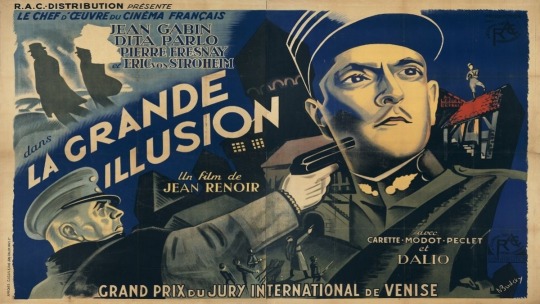
The “grand illusion” of Jean Renoir’s great French film referred originally to the British author Norman Angell’s belief that the supposed financial advantage of war is a falsehood. For Renoir - himself a veteran of the World War One trenches - this illusion evolves into something more complex and various, and so does its tragic and ironic grandeur.
There are only two references to the title but both are pertinent. Once when a French soldier exclaims ‘what an illusion,’ when a comrade says that the war will be over before they have time to escape from military prison, and again when he describes the end of all wars as an illusion.
The legendary Eric Von Stroheim is Captain Von Rauffenstein, an aristocrat and German PoW camp commander in the first world war, ramrod-straight in a uniform with white gloves that conceal horrendous burns from when he was shot down in combat. He pursues an elaborately civilised policy of martial respect for his distinguished prisoner Captain de Boeldieu (Pierre Fresnay) - a suave French aristocrat in his own right. But Rauffenstein is archly disdainful of Boeldieu’s more plebeian comrades Rosenthal (Marcel Dalio) and the boisterous working class Maréchal, played with luminous masculinity by Jean Gabin.
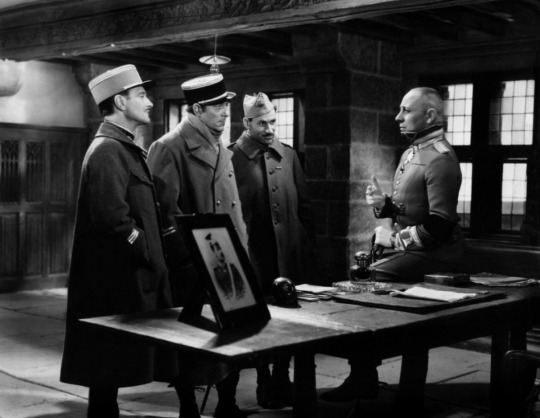
What the Frenchman knows and the German won’t admit is that the new world belongs to commoners. It changed hands when the gentlemen of Europe declared war. And the “grand illusion” of Renoir’s title is the notion that the upper classes somehow stand above war. The German cannot believe that his prisoners, whom he treats almost as guests, would try to escape. After all, they have given their word not to.
"Neither you nor I can stop the march of time,” the captured French aristocrat Capt. de Boieldieu tells the German prison camp commandant, Von Rauffenstein. A little later, distracting the guards during an escape of others from the high-security German fortress, the Frenchman forces the German to shoot him, reluctantly, and they have a final deathbed exchange. `” didn’t know a bullet in the stomach hurt so much,” he tells the German. “I aimed at your legs,” says the German, near tears. And a little later he says: "For a commoner, dying in a war is a tragedy. But for you and I - it’s a good way out.”
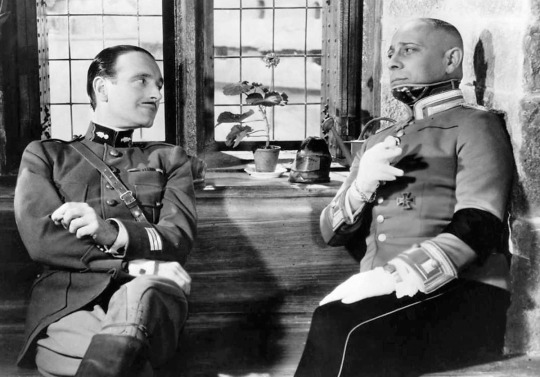
For me one the things that hit me is how much the film underlies the separation of classes, which is the second major concern of the film. Indeed, the characters provide a microcosm of the European class system in the early twentieth century. It is interesting to note that not everyone in the film is limited by the barriers of his mother tongue. The two aristocratic officers, von Rauffenstein and de Boeldieu, as well as the scholar, Demolder, can speak or understand several languages other than their own. The Jewish officer, Rosenthal, who has relatives on both sides of the front, can speak German. With the possible exception of Rosenthal, however, the linguistic skills of these characters are ineffectual instruments of human understanding. The reasons are various and have mostly to do with class.
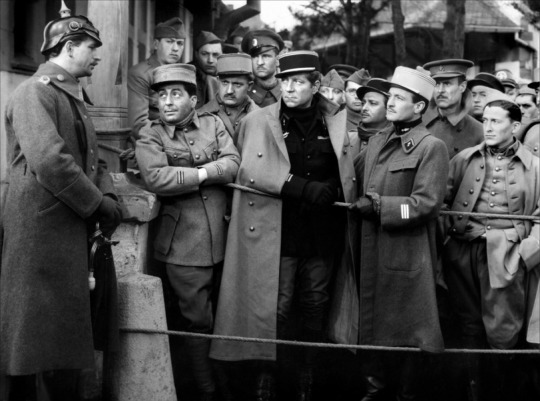
Demolder, the Greek professor, is the object of much ridicule. To the aristocrats he is never more than a subject of minor amusement. They ignore him, for instance, when he gawks like an undergraduate art history student at the Medieval fortress of Wintersborn, where they are being held prisoner. Even the middle class Marechal parodies him at one point, exclaiming that the castle is ``Fourteenth century,” to which Boeldieu replies wittily, “Pure Gothic.” Ironically, the scene was actually shot in a chateau built by Wilhelm II.
Demolder’s books, in which no one else is the least bit interested, disturb Boeldieu’s cards. Boeldieu remarks “coldly” that Demolder’s dictionaries are going to be in his way. Demolder is in the process of translating Pindar, whom he considers “the greatest of the Greek poets.” We are left in no doubt, however, that the undertaking will not be as momentous as Demolder would like to think. Rauffenstein’s contemptuous comment upon learning of Demolder’s activity is: “Poor old Pindar!”
Boeldieu says that Demolder has “the soul of a bird.” Although Demolder has a sentimental worship of books (he is incensed when the Russians set their books on fire) and studies a foreign language, his interests are ineffectual. The student of a “dead language,” he offers no help in bridging the language barrier between the French and Germans.
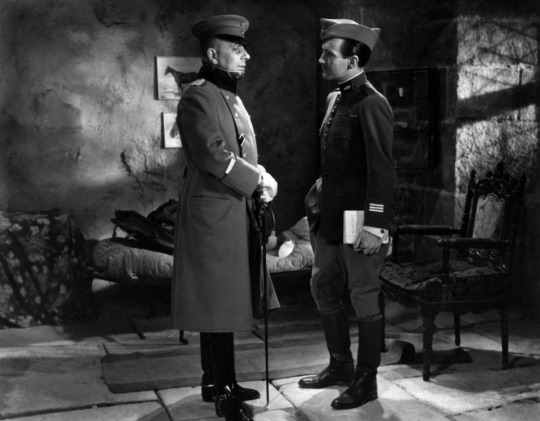
The aristocrats, Boeldieu and Rauffenstein, might effect such a bridge between the nationalities, but they are prevented from doing so by the duties and isolation of their class. They are separated from their fellow officers as much as anything by language.
Boeldieu, for instance, is isolated by a certain class dialect as well as what one might call his ideolect. Throughout the film, he speaks in a witty, formal, epigrammatic style typical of the aristocracy. At Hallbach, noticing the young German soldiers drilling while the prisoners of war prepare their play, he comments: “On one side, children playing at soldiers. On the other, soldiers playing at children.” The conversation at Wintersborn is distinguished by his witty banter with Rauffenstein. When the latter has finished showing his new prisoners around the fortress, Boeldieu remarks: “It was very pleasant of you, sir, to have shown us around your estate.” The other French officers cannot or are not allowed thus to “pull off” their attempts at wit. Marechal’s amusing joke about Maxim’s does not go over with Rauffenstein.
Boeldieu’s formal style leaves his fellows cool to him and indeed suspicious of his motives. Marechal himself, who must “explain” Boeldieu to the others, notes at one point that “he’s a good bloke, but you can’t let yourself go with him, you can’t feel free…. A different sort of education…. If ever you [Rosenthal] and I found ourselves in a bad spot, we’d just be a couple of poor down-and-outs, but him, he’d always be Monsieur de Boeldieu.”
Later in the film, when the bourgeois Marechal, aware of Boeldieu’s impending sacrifice, attempts a deeper level of friendliness, Boeldieu puts him off: “I’m not doing anything for you personally. That excuses us from the danger of getting emotional.” When Marechal questions Boeldieu’s continued use of the formal “vous” after eighteen months together, Boeldieu responds: “I say vous to my mother and my wife.”
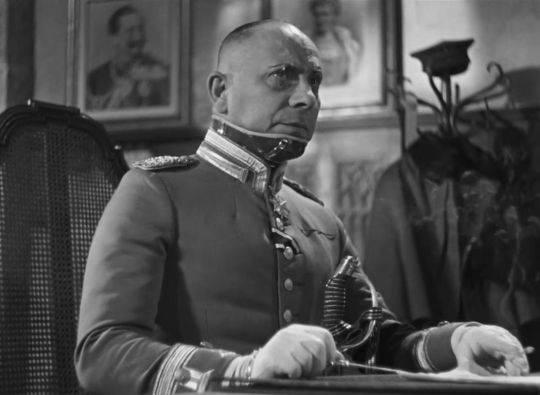
Rauffenstein is similarly isolated from his fellow officers by class and language. His preferred languages seem to be French and English, and when he does speak German his voice takes on an unaccustomed and alien rasp. His junior officers are also of the middle class, and they consider him something of a lunatic for what is to them eccentric behavior. Rauffenstein’s careful cultivation of the geranium, “the only flower in the castle,” is ridiculed by his martinet of a junior officer, a former headmaster who claims to “know how to keep that gang of devils [the prisoners] in their place.” Interestingly, in the moving scene of Boeldieu’s death, Rauffenstein sacrifices this last “flower of the aristocracy.”
Boeldieu and Rauffenstein, isolated from their fellow officers, have the most in common with each other, but ultimately they are separated by something else they have in common: their patriotic duties as aristocratic career officers. Rauffenstein seems to regret this more than Boeldieu and is keener to maintain their priviledged intimacy. To effect this intimacy he makes continual use of the English language.
A language common to the aristocracy of Europe, English allows Rauffenstein to distinguish himself and Boeldieu from the others, in effect to talk over their heads. It becomes their special language. In the early banquet scene, Rauffenstein, recognizing Boeldieu’s name, presumes his knowledge of English. Sesonske has pointed out that “Rauffenstein switches from French to English without question or explanation, knowing that a `de Boeldieu’ will of course understand,” whereas “Marechal is surprised to find his German neighbor speaking French and seeks an explanation.”
In a later scene at Wintersborn, Rauffenstein shows off his twenty-five Maxim machine-guns to Boeldieu and the others. Marechal attempts to imitate Boeldieu’s witty style: “Why, of course, sir. Personally, I prefer the restaurant…” The response of the two aristocrats to this infringement on their stylistic territory is interesting. Boeldieu, at whose expense the joke is made, accepts it with a benign resignation, as a master does a pupil’s imitations: “Touché.”
Rauffenstein, on the other hand, will not condescend to the humor of an inferior. He shifts immediately to English, talking as he knows over the heads of the others: “I used to know a pretty girl at Maxim’s… back in 1913. Her name was Fifi.” Boeldieu responds also in English: “So did I.”
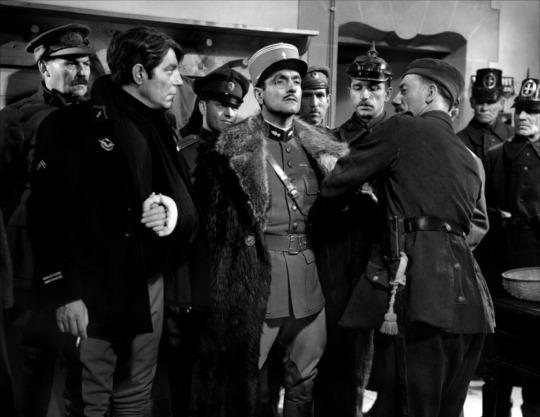
Rauffenstein’s aristocratic snub recalls, as he likes to do, a nostalgic time before the war when aristocratic career officers did not have to accept middle class “officers” such as Marechal and Rosenthal as in any sense their equals.
Both Rauffenstein and Boeldieu know, however, that the old European aristocrats, along with the peculiar form of international understanding they possessed, are a dying breed, cut off from their own lower classes and no longer in control of events. In a private conversation in Rauffenstein’s quarters, again punctuated with English phrases, they discuss this situation candidly.
Rauffenstein admits his distaste for his present position as commandant. “I was a fighting man and, now, I am a bureaucrat, a policeman. It is the only way left for me to try and serve my country.” When Boeldieu asks him why he made an exception in inviting him to his quarters, Rauffenstein responds disdainfully: “You call Marechal and Rosenthal… officers?” Whatever else the war brings, “it will be the end of the Rauffensteins and the Boeldieus.”
To Rauffenstein, such middle class soldiers are “the charming legacy of the French Revolution.” Boeldieu comments that “perhaps there is no more need for us.” Rauffenstein immediately asks: “And don’t you find that is a pity?” Boeldieu responds, less certainly: “Perhaps.” Boeldieu’s scepticism suggests that if there is to be a solution to the problem of lack of international understanding, it will not come from an international aristocracy with an exclusive language.
Indeed, this point is dramatised in the final exchange of English between the two men. When Boeldieu devises a plan of escape for Marechal and Rosenthal, he reserves for himself the role of creating a diversion. While all the prisoners except Marechal and Rosenthal assemble for a general roll call, Boeldieu climbs the watch-tower and plays the tune, “Petit Navire,” on a flute (an instrument he claimed earlier to have hated). He distracts the Germans long enough for his middle class comrades to effect their escape. When Rauffenstein learns of Boeldieu’s dangerous escapade, he makes a final personal appeal to Boeldieu to surrender. Interestingly, the appeal is in English, unintelligible to his own men and the various prisoners.
Rauffenstein in English: Boeldieu, have you really gone insane?
Boeldieu in English: I’m perfectly sane.
Rauffenstein in English: Boeldieu, you understand that if you do not obey at once and come down, I shall have to shoot…. I dread to do that. I beg you… man to man, come back.
Boeldieu in English: It’s damn nice of you, Rauffenstein, but it’s impossible.
At this point, Rauffenstein is forced to shoot Boeldieu, and only afterward learns that Marechal and Rosenthal have escaped. To himself in English (in a language he can now use only with himself) he mutters, “so that is why,” and suddenly shifting to a harsh German, orders the dogs called out to search for the escapees. In the end, the mutual intelligibility of the aristocrats is overcome by their intense sense of divergent duties. As Boeldieu comments on his deathbed when Rauffenstein begs his forgiveness, “I would have done the same thing. French or German… duty is duty.” However moving the scenes with the two aristocrats may be, thay cannot offer a solution to the problem of human understanding that the film poses. They represent rather a dead end.
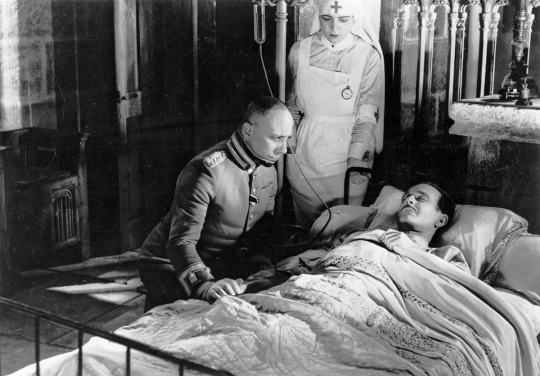
If there is to be such a solution, Renoir seems to tell us, it must come from the middle class, from the Marechals and Rosenthals and Elsas of Europe. Accordingly, these characters dominate the film’s final scenes.
La Grand Illusion’s most basic contributions to cinema include a series of well-followed tropes used in later prison escape films. Hiding their escape hole under floorboards beneath a bunk, the men tie a rope to a single mole digging the passage deeper. Air flows to him through a tube of cans, and a string attaches to a warning tin that he pulls to sound his readiness for relief. The excess earth is stored in small bags and emptied from under their pants during their faux gardening activities. Later escape-centric films such as Frank Darabont’s The Shawshank Redemption (1994), John Sturges’ The Great Escape (1963), and Le Trou (1960) by Jacques Becker (himself the assistant director on Grand Illusion) replicate aspects of the escape procedure established in Renoir’s film.
In originating tropes of a war or escape movie it was careful to avoid cliches of its own. La Grand Illusion features no “war is Hell” scenes of grisly trench warfare that convey the chaotic bloody truth of battle. Neither melodrama nor jingoism have roles in Renoir’s narrative. He even carefully resists all clichés about patriotism, as well as clichés regarding his own pacifist aims. Avoiding strong subjective illustrations, Renoir’s film remains politically impartial, even while he makes humanist indictments and remains a jealous disciple of his homeland.
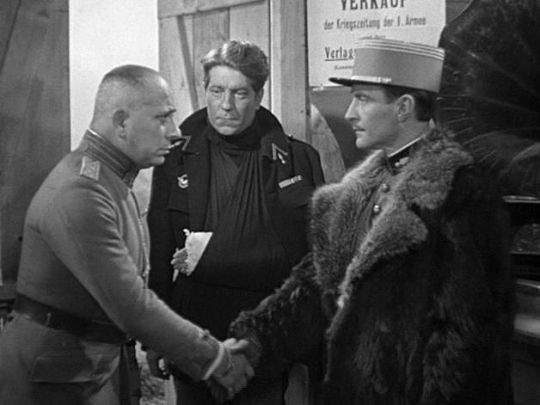
It’s not then a movie about a prison escape. It dwells on the conflicts among men. The prison camps show the entire national community in a bubble. Ideas such as nationalism, class, and race create the conflict between the prisoners; however, at the same time, they bring people together.
It’s also a meditation on the collapse of the old order of European civilisation. Perhaps that was always a sentimental upper class illusion, the notion that gentlemen on both sides of the lines subscribed to the same honourable code of behaviour. Whatever it was, it died in the trenches of World War One. The idea that wars can be fought according to gentlemanly rules is an illusion – like the belief that the 1914-1918 conflict was the war to end all wars. As Plato said at the beginning of the birth pangs of European civlisation, ‘only the dead have seen the end of war’.
91 notes
·
View notes
Text
Winchesters in Gotham 4
1, 2, 3
Previously: “I received two invitations one for Batman, and the other for Bruce Wayne. Robin is going to fill in for Batman, and Y/N is going to fill in for Bruce Wayne.”
You change into a white collared shirt and black slacks. Glancing into the mirror you chuckle to yourself. Add a blue tie and a tan trench coat and you would be wearing an outfit similar to Cas’ normal outfit. You slip on some black flats then meet Batman and Robin back in the bat cave to figure out the plan. You and Robin are going to take separate cars so people won’t be suspicious.
“See you at the museum I guess.” You say to your friend. Robin smiles in response.
“Where’s Bruce Wayne?” The usher asks.
“He couldn’t make it tonight so he sent me instead.” You explain, thinking on your toes. The usher nods and allows you in. You quickly scan the area looking for threats. You don’t see any so you hesitantly put your guard down..
Robin walks over to you and places a hand on your shoulder scaring you half to death. “Holy shit Robin!” You exclaim.
“I’m sorry.” He says not sounding apologetic. He then starts to whisper. “Find anything yet?”
“Not yet, what about you?” You whisper in response. Robin shakes his head before walking away.
The two of you are there for an hour without any incident. Robin disappeared either in the rafters or somewhere amongst the crowd. When the Joker shows up he makes a dramatic entrance.
“Ladies and Gentlemen, boys and girls- welcome to the Gotham City Museum. Let’s have some fun!” He says before laughing like a maniac. “Now, all of you are my prisoners until the ransom is payed!” Everyone in the room shifts uncomfortably.
“Joker.” Robin nearly yells, he then jumps from the rafters to the ground. The only reason why your friend isn’t dead is because of a safety line attached to his utility belt.
“Ah, if it isn’t Robin the boy wonder.”
“Let these people go.”
“Now tell me boy wonder why would I do that?”
“Because one hostage is enough.” You say walking forward and standing next to Robin. “If you want Batman to be lured here, seventy hostages isn’t the way to go.” The Joker has a glint in his eyes that screams murder.
“Very well. One condition though.”
“And that is?” The green haired psychopath pulls out a gun out of the folds of his coat.
“That I get to pick who goes down with a bang tonight.” He then points his gun towards you and pulls the trigger as he laughs like a mad man.
Five gunshots ring out and you stumble backwards clutching your stomach, it feels like it’s on fire. The crimson liquid stains your hand and shirt, as it rolls down your abdomen and into the waistband of your pants. You lean against a column for support.
“Y/N!” Robin exclaims. Gravity eventually takes over and you slide down the pillar. Robin thankfully catches you before you crack your head open.
“Robin…” You say. Black dots creep into your line of vision. It’s also starting to hurt to breathe, right now all you want to do is close your eyes. You subconsciously hit the distress beacon on your watch as Robin does the same on his.
“Come on Y/N, stay awake.“ Robin murmurs, as he brushes your hair out of your face with his fingers. “Help is on the way.”
“Easier said then done…” You reply trying to get air back into your lungs, but your lungs seem to be broken currently. “It’s hard to breathe.”
“Just stay with me okay.” Your friend says as he does what he can to slow the bleeding. You yelp like an injured dog when he applies pressure on your wounds.
When Batman as well as the ambulance arrive, Robin’s voice sounds like the two of you are separated by a pane of glass. You’re starting to feel numb, you barely notice the paramedics putting you on a gurney then in the ambulance.
The last thing you remember before you lose consciousness is metal doors, a cold draft and a bright surgical light. Then blackness.
🐝 🐝 🐝 🐝 🐝
-Batman & Robin’s POV, museum-
“How’d you know to send the ambulance?” Robin asks after the Joker flees.
“I’ll explain when we get to the batcave. For the moment, we need to keep Y/N’s name off the news and out of the papers.” Batman replies. The two heroes walk out of the museum only to be bombarded by the press. The main questions asked are: what happened here, where’s the Joker, and who was injured. Eventually Batman and Robin manage to get away from the reporters. The duo heads back to the bat mobile and drive back to Wayne manor.
Batman walks over to one of the computers, and shakes the mouse. When the screen turns on there are two sets of vitals on it. “You were tracking our vital signs?” Robin asks a bit confused. Batman nods.
“I came up with the idea after Y/N was kidnapped by Crowley awhile ago.” He replies. The vital signs on the bottom of the screen plummet, and flat lines. “No…”
“What if the doctors removed her watch?” Robin says in a hopeful voice.
“It is a possibility Robin, but we don’t know for certain.” Batman and Robin wait with abated breath for something to happen. After three long minutes the line starts moving again. You flat line three more times in the next four hours. Batman and Robin change clothes, back to Bruce and Dick before heading to Gotham Hospital.
“Family of Y/N Winchester?” A doctor asks. Dick and Bruce stand up and walk over to them.
“Is she going to be alright?” Bruce asks.
“We lost her on the table a few times, but she pulled through. As of this instant she’s in a coma and currently on life support.”
“Can we see her?“ The doctor nods and leads them to your hospital room. Dick grimaces when he sees all tubes and wires attached to your body.
Bruce notices the bat symbol in the sky. He sighs. He then tells Dick that they should go. Dick reluctantly agrees with Bruce and the two of them leave.
🐝 🐝 🐝 🐝 🐝
-Moments later, Gotham sirens POV-
Salina’s the first to find out that you got shot, she then tells the other sirens. Harley is the first one to the hospital. “Oh Thrushy.” She says when she sees you.
When Ivy shows up, she places a small potted plant on the bedside table- she then coaxes the plant to blossom. “What kind of plant is that?” Harley asks.
“(Favorite flower), Y/N loves them.” Ivy answers. “It brightens the room a bit.”
“That’s true.” Salina replies, as she enters the room from the window. “How’s our little bird doing?” Both Harley and Ivy shrug in reply.
“What happened?” Ivy asks.
“You know about the shooting at the museum, right?”
“Barely.”
“Well according to Batman, Y/N was at the museum- and she was the person who got shot.”
“Do you know who the shooter was?”
“The Joker.”
“I’m going to kill him.”
To be continued
@the-third-winchester-warrior @flannels-and-rocksalt @always-keep-writing-spn @winchesters-favorite-girl @caroldanversinatardis @the-writer-in-blue @spnkisum @thewinsisterchronicles @simply-wins-little-sis @moose-and-sqruille-lover
#nanana batman#sam+ sister reader#supernatural#supernatural brother sister moment#sam and dean#winchester sibling#winsister#winchester sister#batman and robin#dean + sister reader#sister winchester#lil winchester#littlesister!reader#supernatural reader insert#batman#batmobile#dick grayson#bruce wayne#crossover story
24 notes
·
View notes